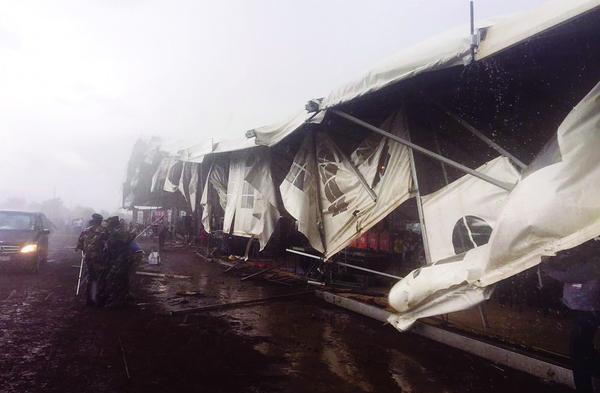A violent storm that ripped through a marquee, where President Jacob Zuma was addressing the Reconciliation Day celebration in Gopane, near Zeerust, in North West on Friday, has left traditional healers and seers wondering why the gods displayed such wrath.
“Anger is hard to hide. This is a sign of compromised spirits,” said Solly Nduku, the general secretary of the National Unitary Professional Association for African Traditional Health Practitioners of SA.
He added that the incident was not necessarily a show of anger by the ancestors towards Zuma, but it might be pointing to a country that had generally “forgotten its spiritual being”.
“I do not think the collapse of the marquee had anything to do with the president as an individual or Marikana, because that was a Day of Reconciliation event, not a Marikana commemoration,” he said, while noting that the tent blew off seconds after Zuma had referred to Marikana in his speech, which ended abruptly thereafter.
On the subject of Marikana, Zuma declared: “The incident was painful and traumatic, not only for the families, but all South Africans.”
That’s when the gale blew, sweeping up the tent from its foundations.
It was not the first time the president had to be whisked away from an event because of a tent blowing away in stormy weather.
It also happened on September 24 2012 at Lotana village in Tsolo in the Eastern Cape. Zuma was attending a Heritage Day event, organised by the Dosini clan of the amaMpondomise nation.
Nduku was present on that day, and people witnessed Zuma’s bodyguards jumping up to rescue him as the storm wreaked havoc, forcing him to leave the venue before he even had a chance to speak.
Nduku described the incident in Tsolo as being “not about the president personally, but an issue of amaMpondomise and their internal problems. Having said that, if these events point to an unhealthy state of the country because he [Zuma] is the head of state, he is going to be affected as the leader.”
Nduku said Reconciliation Day should not be treated as a formality, but rather commemorated in the name of the people who suffered and died during apartheid.
He said most of the deceased had deep spiritual beliefs and recalled how, during past Reconciliation Day events, interfaith prayers and rituals had been conducted at Freedom Park in Pretoria to appease the spirits of the departed. “We need to appease the ancestors and ask for their guidance and blessings before we host such ceremonies. I am not sure if this was done in this case. If we forget our heritage and culture spiritually, we will become a sick nation.”






 WhatsApp us
WhatsApp us 

